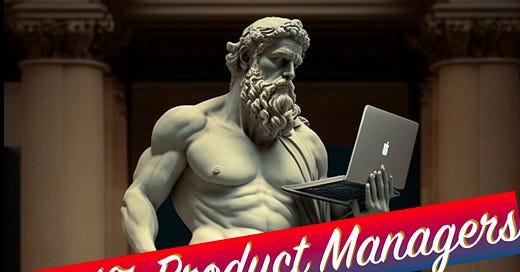Why is product management so obsessed with tropes and bromides like "Top 1% Product Managers" and "Good Product Managers _____ Great Product Managers______"?
Is it something unique about the profession? About people drawn to the profession? About broad curiosity about the role? Or all three? Or something else? 🤷🏼♂️
I never read posts from HRBPs talking about "1% HR Business Partners". You don't hear:
HR Business Partners in the top 1% don't just know the company's policies; they wrote them.
I never read posts from designers talking about rockstar designers or Top 1% Designers. You don't hear:
Rockstar UX designers don't just design interfaces; they design parallel universes and make you feel like you've always belonged there.
No. If anything, designers are TOO self-effacing sometimes. Something is up with Product Management. Here's my take:
Many content creators fall for the easy, catchy, click-bait title. These articles "perform". Who doesn't want to know what the BEST do (even if it is highly contextual)?
There is a lot of ambiguity about what product managers do, and hyperbole is another way of stressing the details of the role. By highlighting "the best" (and "the worst"), we perhaps emphasize what is possible.
Lots of people want to become product managers, and it attracts its fair share of hyper-competitive optimizers. HCOs want to be "the best", and sheer competence is insufficient (apparently).
This may be controversial, but many product managers are insecure about the value they offer. They don't build, they don't design, and they don't manage. The Top 1% mythology gives a conveniently self-reassuring narrative—that outsized impact is within reach! That "truly great" product managers are true catalysts.
Product managers can "make or break" an effort. We intuit (correctly) that product managers are essential, and this translates into a (less correct) perception of the "curve" linking PM expertise to outcomes. Does moving from a 90th percentile PM to a 99th percentile PM 10x outcomes? It certainly supports #3 above, but I'm not so sure.
Views of PdM slip into weird, meritocratic, Silicon Valley mythology-tinted "great man theory" all the time. Great man theory posits that powerful leaders and artists shape the course of history through their actions and personalities. These individuals possess unique traits or abilities that set them apart from the general population, and their actions and decisions significantly impact the world. Great Product Man-ager Theory is a thing.
Finally, product managers are routinely thrown into "sink or swim" situations. Heroics and succeed-at-all-costs are the norm, not the exception. It is part of the mythology. Only the "great" survive.
Why does this matter? Product management desperately needs to embrace diversity. How we express competence REALLY matters. We need fewer bro-mides, and more thoughtful content on knowledge, skills, and experience.





Something I've noticed stood out to me in your post: "They don't build, they don't design, and they don't manage."
The best PMs I've worked with were actually still makers but working more in reverse; ultimately they make time.
While time isn't a construct that's generated or produced it's more pared away as a great sculptor works in marble or clay. By removing the excesses they provide shape and form to any given day or week so the right activities can manifest great products and experiences. Carving the days into productive discussions, protected flow states for deep work, and managing expectations so everyone's able to find shared success is very much an art form rather than a science.
It may not be sexy but it's magical when working well.
This tracks so true to me. I think Marty Cagan's books first gave this idea that a Product Manager has to be a maniacally workaholic, insanely talented person to be good at their job, but then if they're that way already, they could probably do everything wrong and succeed...